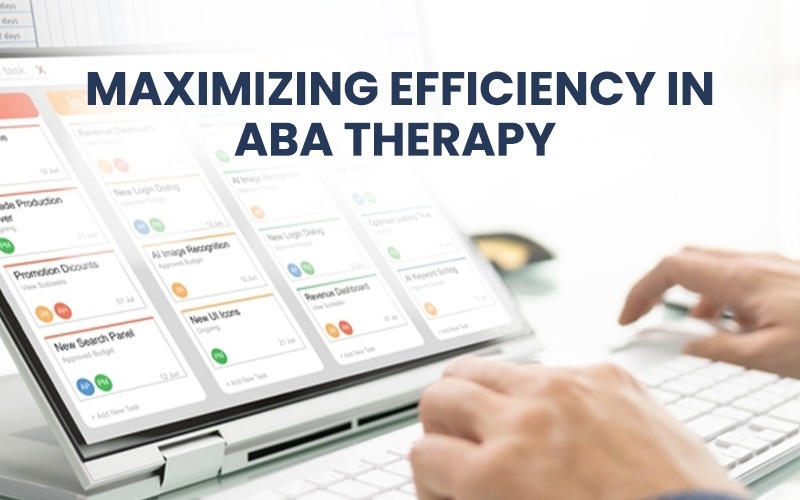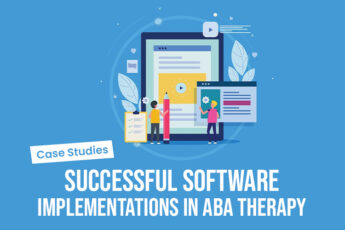Applied Behavior Analysis (ABA) therapy is a scientifically proven method for improving social, communication, and learning skills in individuals with autism and other developmental disabilities. However, delivering effective ABA therapy requires meticulous planning, scheduling, and coordination. This is where advanced scheduling software can play a crucial role in maximizing efficiency and optimizing the therapeutic process.
The Challenges of Traditional Scheduling Methods
- Traditional scheduling methods, often involving spreadsheets, pen-and-paper calendars, or basic scheduling apps, present several limitations for ABA therapy practices:
- Time-consuming and error-prone: Manually managing appointments, client information, and therapist availability can be incredibly time-consuming and prone to errors. This can lead to double-booking, missed appointments, and wasted time.
- Traditional methods often lack the ability to provide real-time visibility into therapist availability, client schedules, and ongoing progress, resulting in limited visibility and coordination. Consequently, it becomes difficult to effectively coordinate appointments, allocate resources, and track client progress.
- Lack of data insights: Without a centralized system for storing and analyzing data, it’s difficult to identify trends, measure effectiveness, and make informed decisions about treatment plans.
Advanced Scheduling Software: A Game Changer for ABA Therapy
Advanced scheduling software specifically designed for ABA therapy can significantly streamline operations, enhance efficiency, and improve overall outcomes. Here’s how:
1. Automated Scheduling and Appointment Management:
- Real-time availability: The software displays therapist availability in real-time, allowing for efficient appointment booking and eliminating the risk of double-booking.
- Automated reminders: Automated reminders for appointments and progress reports reduce the chances of missed sessions and ensure client engagement.
- The software accommodates various scheduling needs, including one-on-one sessions, group therapy, and virtual sessions. Thus allowing for greater flexibility and personalization.
- Online booking: Clients can book appointments online, eliminating the need for phone calls or emails and enhancing convenience.
2. Enhanced Collaboration and Communication:
- Centralized platform: All client information, session notes, treatment plans, and communication are centralized in one platform. ensuring seamless collaboration among therapists, supervisors, and parents.
- Secure messaging: Secure messaging features allow for real-time communication between therapists, parents, and clients, fostering better understanding and facilitating communication regarding client progress and any concerns.
- Progress tracking: The software allows therapists to track client progress and easily share data with parents and supervisors, leading to more informed decision-making and personalized treatment plans.
3. Data-Driven Insights and Improved Outcomes:
- Automated reporting allows you to generate comprehensive reports on session attendance, client progress, and therapist performance, thereby providing valuable insights into the effectiveness of treatment plans and areas for improvement.
- Performance analysis enables you to track key performance indicators (KPIs) like session completion rates, client engagement, and treatment adherence, thus identifying opportunities for optimization and continuous improvement.
- Data-driven decision-making: The wealth of data collected helps ABA providers make informed decisions about resource allocation, treatment plans, and staff training, ultimately improving outcomes for clients.
Benefits of Implementing Advanced Scheduling Software
- Increased Efficiency: Streamlined workflows, automated tasks, and real-time visibility save time and resources, allowing therapists to focus on providing quality care.
- Improved Client Satisfaction: Convenient appointment scheduling, personalized treatment plans, and improved communication enhance the client experience and foster trust.
- Enhanced Collaboration: Centralized platform and secure communication features promote effective collaboration among therapists, supervisors, and parents.
- Data-Driven Insights: Valuable data insights help track progress, identify areas for improvement, and make data-driven decisions.
- Financial Efficiency: Improved scheduling efficiency, reduced no-shows, and better resource allocation can significantly contribute to cost savings.
Choosing the Right Software
Choosing the right scheduling software is crucial for realising its full potential. Consider factors like:
- Features and functionality: Evaluate the features offered by different software options and ensure they meet your specific needs.
- Integrations: Check for integrations with existing systems, such as electronic health records (EHRs) or billing software.
- User-friendliness: Opt for software that is intuitive and easy to use for both therapists and clients.
- Security: Choose software that adheres to industry-standard security measures to protect sensitive client data.
- Support: Ensure that the vendor provides adequate support and training to ensure a smooth transition and ongoing assistance.
Conclusion
Advanced scheduling software is an invaluable tool for ABA therapy practices, offering a range of benefits that can transform operations, enhance efficiency, and ultimately improve outcomes for clients. Therefore, embracing this technology can significantly enhance the delivery of ABA therapy. By embracing technology, ABA providers can streamline workflows, improve communication, gain valuable insights, and, as a result, dedicate more time and energy to delivering the highest quality care.







Leave a Comment